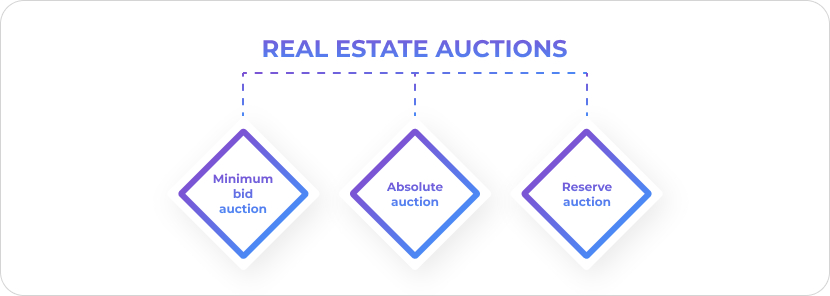How to build an auction platform for real estate
- 07.06.2024
- 1 views
- 10 min
Contemporary auctions occur in both physical and digital realms
Contemporary auctions occur in both physical and digital realms, enabling individuals to bid on a diverse array of items such as artwork, apparel, household appliances, vehicles, and properties. This article specifically delves into the mechanics of real estate auctions, providing a detailed guide on how they operate and offering step-by-step insights into building a bidding platform. Whether you're seeking to understand the intricacies of real estate auctions or contemplating integrating auction features into your current real estate platform, this article serves as a valuable resource.
Types of real estate auctions
Real estate auctions come in three main types:
- Minimum bid auction: Here, the seller can establish a minimum reserve price for a property, and buyers start bidding from that reserve amount.
- Absolute auction: In this scenario, there's no reserve price, and the property is sold to the highest bidder, regardless of the bid amount.
- Reserve auction: Unlike the minimum bid auction, in a reserve auction, the seller doesn't disclose a minimum bid. Instead, they retain the right to accept or reject the highest bid within a specified timeframe.
It's common for most online real estate auctions to begin with a minimum opening bid.
Types of sales and properties at real estate auctions
Online auctions typically feature specific categories of real estate properties, including foreclosed, short-sale, bank-owned, flipped, and retail properties. Here's an overview of each property type:
- Foreclosed properties are homes seized by lenders and put up for sale to recover outstanding loan balances. This process aims to find a mutually beneficial solution for both lenders and borrowers.
- Short sales occur when homeowners sell their properties for less than the remaining mortgage amount. It's a way to avoid foreclosure, benefiting both the lender and the borrower by saving time and expenses.
- Bank-owned or real estate-owned (REO) properties are those that didn't sell at foreclosure auctions. They often come with discounted prices, making them attractive for real estate investors and commonly found on auction platforms and bank websites.
- Flipped properties are investor-owned homes that have been renovated and are ready for resale. These properties undergo remodeling and upgrades to generate profit for investors and appeal to first-time homebuyers.
- Retail property sales cater to investors and business owners looking to expand their portfolios. These properties include storefronts, shopping centers, beauty salons, and other commercial spaces popular among service businesses.
Users of your real estate auction platform
In essence, an auction marketplace serves as a bridge between property sellers and buyers, facilitating transactions between the two parties. However, the roster of roles involved in your real estate auction platform may be more comprehensive. Below, we outline the types of users your software is likely to attract:
Sellers encompass a range of individuals, including homeowners, real estate agents representing homeowners, real estate investors, and asset managers overseeing REO sales. It's crucial for users in any of these roles to possess the necessary licensure to sell real estate through auctions.
Buyers consist of individuals seeking properties at favorable prices. These may include real estate investors, prospective homeowners, or brokers and agents acting on behalf of such individuals.
The auction platform operator bears responsibility for the platform's organization and functionality, ensuring a seamless experience for both sellers and buyers.
Must-have features for your real estate auction platform
- Registration, Login, and User Management
Joining a real estate auction platform begins with seamless registration and login processes. Users, regardless of their role, provide essential personal and contact details. Real estate professionals, including investors, agents, and asset managers, often must verify their credentials. Buyers, on the other hand, input payment information for transactional purposes. Flexible profile management allows for easy updates, ensuring user convenience.
- Property Listings: Empowering Sellers
- Creating Listings: Sellers have the ability to create detailed listings, determining bid durations and making necessary modifications.
- Listing Details: These listings often include property descriptions, photos, and even 3D tours, providing potential buyers with comprehensive insights into the properties on offer. Legal notes and disclaimers further enhance transparency, ensuring all parties are well-informed throughout the process.
- Search Functionality: Enhancing Discovery
Robust search features are essential for facilitating property discovery on auction platforms. Filters enable users to tailor their searches based on location, price range, and property type. Saved properties and search parameters allow users to easily revisit their preferred listings. Integration of maps provides an intuitive way for users to visualize property locations and narrow down their options.
- Bidding Process: Facilitating Transactions
The bidding process is the core action on a real estate auction platform. Most platforms require a deposit before allowing buyers to bid on properties. Bidding typically occurs in real-time, with participants vying for properties 24/7. Once the auction concludes, the winning bidder secures the property, marking the successful closure of the deal.
- Auction Calendar: Keeping Users Informed
An auction calendar serves as a valuable tool for users to stay informed about upcoming auctions. Filtering and sorting options enable users to easily find auctions based on their preferences, such as date, location, and property type. This feature ensures that users never miss out on opportunities to participate in auctions that match their interests.
- Bidder Dashboard: Managing Bidding Activities
- Property Notification Emails: Keep users updated on relevant information, such as new properties in their preferred areas or bid confirmations.
- Saved Properties: Allow for easy access to preferred listings.
- Bid Management Tools: Enable users to place and monitor bids seamlessly.
- Automated Reporting Functionality: Provide valuable insights into bidding trends and activity history.
Conclusion
Creating a successful real estate auction platform requires careful consideration of these essential features. By prioritizing user experience and functionality, developers can build platforms that cater to the diverse needs of both buyers and sellers in the real estate market.









